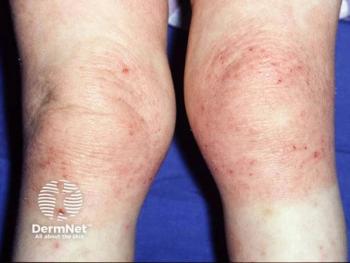
Sexual Dysfunction and Atopic Dermatitis
Unlike other psychological comorbidities, sexual dysfunction is a little explored field within AD.
The results of a recent study published in Life illustrated the paucity of literature surrounding the association between atopic dermatitis (AD) and sexual dysfunction. As the significant physical—as well as psychosocial—repercussions can negatively impact quality-of-life (QOL) of affected patients, a more in depth understanding of the association between sexual dysfunction and AD can help clinicians better treat and manage this patient population.
Thought to affect approximately 10% of the world population, atopic dermatitis or atopic eczema is a chronic relapsing inflammatory skin condition associated with a variable morphology, distribution, and disease course, according to the study. The precise pathophysiology of AD remains vague but appears to be the result of a combination of genetic and environmental factors that induce skin barrier dysfunction, cutaneous, and systemic immune dysregulation, and skin microbiota dysbiosis, resulting in the typical clinical presentations of the disease.
Therapeutic goals of AD usually require a multistep approach, wrote the investigators, focusing on recuing pruritus and establishing disease control, which can be achieved using a combination of several therapeutic approaches. This includes moisturizers, topical steroids, and topical immunomodulators—tacrolimus and pimecrolimus (Elidel; Actavis Labs UT Inc). Additionally, phototherapy, and systemic immunomodulators such as cyclosporin, methotrexate, mycophenolate mofetil, can be used should topical treatment fall short of therapeutic goals. Although much has been researched on the treatment of AD, there are few studies investigating its association with psychological impairment and sexual dysfunction in patients, according to the study.
“Given the high prevalence [of AD], it is important to carry out a rigorous study of this condition, considering the wide variety of comorbidities and their impact on the [QOL] of patients who suffer from it,” wrote Laura Linares-Gonzalez, MD, Department of Dermatology, Hospital Universitario San Cecilio, Granada, Spain, and head author of the study.
Linares-Gonzalez and colleagues conducted the study exploring literature for the association between sexual dysfunction and AD. The systematic review was conducted following the Preferred Reporting Items for Systematic Reviews and Meta-Analyses (PRISMA) reporting guidelines and the Cochrane Collaboration methodology for systematic reviews. All relevant articles in English were identified through a search from inception to December 2020 and included the Medline, Scopus, Web of Science Core Collection and SciELO databases.
Five studies that evaluated the prevalence of sexual dysfunction in AD, including data from 8,106 patients, could be retrieved from the dataset. A mosaic of studies was identified including 1 cohort study with 4 years follow-up, 3 studies with a cross-sectional design, 1 case-control study, 2 studies that included healthy controls with a total sample size of 1,747,755 subjects, and 2 studies that compared data with other dermatological conditions such as psoriasis. Two of the studies only refer to the male population when studying erectile dysfunction (ED) in patients with AD, and data showed that most studies found a prevalence of sexual dysfunction in AD greater than 10%.
The researchers also found that the instruments used to assess sexual dysfunction were variable; the most frequently used questionnaire was the Dermatological Life Quality Index (DLQI), which includes one question about this disorder but is not a validated scale for sexual dysfunction.
“[AD] represents a significant physical and psychological burden for both patients and their families,” the study authors wrote. “The impact of the disease on the [QOL] of patients with AD could be related to its severity.”
When evaluating the concomitance of psychological disorders, the study authors affirm that the association of AD with sexual dysfunction should also be studied. “Male sexual dysfunction is mainly represented by [ED],” the authors wrote. “The European Association of Urology defines ED as ‘the persistent inability to achieve and maintain an erection sufficient to allow satisfactory sexual performance.’ The prevalence of ED is high throughout the world, reaching nearly 50% in advanced adulthood, and shares certain risk factors with diseases of a cardiovascular nature. Therefore, we cannot forget that erection is a process in which both psychological and neurovascular phenomena converge when studying a possible association with AD since it can present comorbidities in both aspects.”
Conforming with the literature, the researchers found that more than 30% of patients with AD have significant psychiatric and psychosocial comorbidities. While an increased risk of depression and anxiety, risk of suicide, and sleep disorders have been studied and tested using validated questionnaires, sexual dysfunction is usually insufficiently recorded, not only underscoring the importance of this comorbidity in patients with AD but also the need for clinicians to be wary of the comorbidity in their patients. When exploring the association between sexual dysfunction and AD, the authors said that it is also important to correlate sexual dysfunction with disease severity, previous treatments, and cardiovascular morbidities.
“[AD] is just 1 of the many chronic dermatoses in which there is a significant impact on the sexual life of patients who suffer from it as well as their partners,” they wrote.
Reference:
Linares-Gonzalez L, Lozano-Lozano I, Gutierrez-Rojas L, Lozano-Lozano M, Rodenas-Herranz T, Ruiz-Villaverde R. Sexual dysfunction and atopic dermatitis: a systematic review. Life. 2021;11(12):1314. doi: 10.3390/life11121314
Newsletter
Like what you’re reading? Subscribe to Dermatology Times for weekly updates on therapies, innovations, and real-world practice tips.











